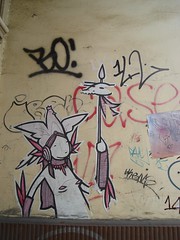
paper figure
Debates and discusions about digital literacy have been rumbling on throughout the Lincoln meeting and the Nottingham conference and seem to me to raise a number of issues. These are:
1. The need for a definition - is the term about 'meaning making practices that are mediated through digital technology', for instance?
2. The need to make connections - between home and school and the flow of texts between these and other contexts.
3. The need to identify and distinguish between what's new and what's cool - for example, multimodality, visual culture, play, interactivity, interlinked and continuous texts, interactive wriiten conversations and so on.
4. The need for curriculum positioning - beginning to sketch out what attitudes, skills and understandings are important in the rapidly changing world of digital tecchnology.
5. The need to articulate a critical digital literacy - an approach that underscores the importance of power, ownership/authorship, authenticity and representation in digital media.
6. The need to explore identity performance - to clarify whether this has become salient in the field of digital literacy because it is attractive to a particular group of researchers or whether it is something that is foregrounded by digital literacy and digital texts themselves.
Some very good points for us to take up in the way we frame the position paper. Clarity, precision, insight - thanks.
ReplyDeleteYes, v helpful as ever. I am also left pondering the relationship/difference between virtual worlds- like your amazing dalekscape- and the drama in education imaginary worlds I used to inhabit with my primary classes..
ReplyDeleteThanks! Yes, very interesting about the drama/role play dimension in virtual worlds. There are many similarities and these are often pointed out by the two drama specialists in our steering group. I suppose the connecting link is play - taking on an identity (in this case an avatar) but here it's mediated in a rather different way...through digital literacy
ReplyDeleteYes I agree this is a useful list. If you use a digital microphone (e.g. blue tooth) and someone hears it, is that digital literacy? (I.e. it is a message mediated through digital technology.) I am wondering if 'mediated through' is right? Maybe we need to say that the text is in the technology somehow? How do we do that? Am I going mad? That thing about critical digital literacy skills is extremely important - especially in order to ensure that we are clear there is a role for educators. Maybe we need, in defining digital literacy, to also in dicate where it dovetails with non digital litertacy etc as that may be a good starting point. It may be useful to talk about Literacy and that digital literacy is a part of that - not better or worse. Sometimes very different. Sometimes very similar.
ReplyDelete...tricky stuff. I started off talking with MP about this at Nottingham. I was all for a definition that centred on screen-based communication, but MP suggested that the iPod shuffle (with no screen) would count. I suppose I'm quite conservatively with Kress on this - if you use the term literacy, then you need to stick with lettered representation. As a group we're moving away from this, but surely there has to be a boundary. If not why don't include the digital cooker? Is an IWB or projector automatically digital literacy... even if it'd displaying a print text?
ReplyDeleteand what about Vic's digital fridge? is that literacy? so maybe this is where the literacy word is limited in its usefulness? which brings us full circle to David Buckingham's arguments against media literacy as a way of understanding how we engage with and make sense of media? We need another three days together to sort this!
ReplyDeleteThis is one reason why I've tended to use digital writing in my work - to be quite precise about what I'm talking about.
ReplyDeleteYes i think this is a good one 'digital writing' to be clear. But I think I also like 'digital text' as for me this carries nuances of a range of modalities working together to make meanings. so that written words collocate in some way with image and where graphology plays a role. I think that while I agree with Kress that literacy is about the writen word, I also think there is an artificial separation sometimes because of the way texts are constructed to use so many modes.
ReplyDeleteSo that begins to look as if digital writing is a sub-set of digital literacy. That works. But then can we legitimately call a Flickr image or downloaded i-tune a form of digital literacy? Or is there a digital culture which involves the consumption and production of digital texts, some of which are intertwined with literacy practices?
ReplyDelete